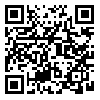BibTeX | RIS | EndNote | Medlars | ProCite | Reference Manager | RefWorks
Send citation to:
URL: http://jcp.khu.ac.ir/article-1-2527-en.html
This study aimed to determine the mediating role of self-regulation in the relationship between thinking styles and students’ test anxiety in Birjand University. The present study is a non-experimental one and of Structural Equations Modeling (SEM) type. The sample size consists of 300 students (150 males and 150 females) who were studying in Birjand University that were selected through multi-stage cluster random sampling method. They completed three questionnaires including Test Anxiety questionnaire developed by Abolqasemi et al. (1996), Self-regulation questionnaire by Pinterich and DeGrowth (1990) and Thinking Styles by Sternberg and Wagner (1992). Then, descriptive statistics such as mean and standard deviation and parameters of inferential statistics and path analysis were applied using AMOS software. The results showed that thinking styles explain 31% of the self-regulatory learning variance and thinking styles with mediation of self-regulatory learning explain 36% of the test anxiety variance. Thinking styles have an indirect relationship with test anxiety through self-regulation. Therefore, identifying different learning styles and skills through self-regulation of the amount of test anxiety they explained. And thus to reduce test anxiety set of programs. As a result, planners and therapists These findings suggest that self-regulation is necessary to reduce test anxiety, and also references to different learning styles as a key variable pay special attention
Received: 2016/05/11 | Accepted: 2016/12/24 | Published: 2017/01/1
| Rights and permissions | |
 |
This work is licensed under a Creative Commons Attribution-NonCommercial 4.0 International License. |




